Mei
Oide
Grade 12,
Foreign Language Course
Graduate at Ogatsu Jr. High
Studied at Colaite Muire, Ireland
From September 2005 through June 2006
Entered Ningen Kankyo University |
| |
| |
| |
 |
| |
| |
| |
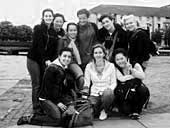 |
| |
| |
| |
 |
|
My English has improved a lot thanks
What
I would like to tell you the most about my exchange program and things
I learned in Ireland are two things. The way I learned English, and the
beautiful country of Ireland.
The first few months I spent in Ireland weren't all fun, in fact. When
I couldn't understand what people were saying at all, they said "Don't
worry, never mind." I felt some kind of sad feelings when I could
only say "Sorry" to them. I knew I should've been braver to
ask what they said. I thought I knew a lot of English grammar and words,
but because I thought so, I was afraid of making mistakes.
After I finished my term in Colaiste Muire, a local high school in Ennis,
I moved to Dublin to learn more English in a language school. As I moved
to Dublin, I decided to do one thing, to say hello and tell my name before
other guys start to introduce themselves. I thought I could be a more
out-going person doing so. It slightly changed me and in the class, I
met such great people to learn with.
One day I spoke about a few tours I joined in on in Dublin city center
in the class. Then the teacher asked me if I was planning a next trip
or not. I had a leaflet of "Glendalough" at that time, one of
the famous sightseeing spots. I introduced that place and said that I
was planning to go there. So, I asked my classmates if they wanted to
come with me. Next weekend almost all my classmates got together to go
out. This trip made us very close.
After that we made up lots of plans to go sightseeing. It was like having
a school trip every week. We visited so many castles, churches and towns.
When we went out together, we never wasted our time and we never forgot
to study English. We taught each other. Sometimes they corrected my wrong
grammar, and I did as well. We discussed words' meanings. We used new
words and new phrasal verbs we had learned in classes in our conversation.
We became more and more acquisitive of English. I can say that my English
has improved a lot thanks to that.
And the country of Ireland is such a beautiful country with wide green
landscapes made by nature, old-fashioned towns, buildings and very, very
kind people.
Ennis is an old, small town with colorful houses. The main street was
especially amazing. I was attracted to those things at first sight. Yellow,
blue, red, sometimes purple... those were really gorgeous!
Most churches were made of stone. Inside the churches were always quiet
and had a solemn mood. The stained glass was so fine and mysterious. I
remember that I spent quite a long time just sitting around staring at
them.
People in Ireland are all cheerful and kind. One of my favorite things
to do was to meet new people on the train. Most of the time when you take
a seat you must share the seat with someone, facing each other. Irish
people were friendly enough to talk to strangers like me. For instance,
one old lady taught me "welcome" and "good-bye" in
Irish. Another lady told me about Irish history. Young boys and girls
asked me about Japan and told me about things happening in Ireland. I
guarantee that you'll never be bored on the train.
I found many differences between Japan and Ireland and I thought there
are several things we must imitate the Irish. For example, we should be
more open to others, like the Irish, to get close to make a safe community.
I know it's hard to do in this present Japanese society, but I'd say there
is a clue to solve this problem in Ireland.
If you have a chance to study abroad and you are still wavering, you should
grab it! It will help you to be wiser, and you can experience lots of
things you can't in Japan.
|
Miki Iwabuchi
Grade 12,
Foreign Language Course
Graduate at Ishinomaki Jr. High
Studied at Mahurangi College, New Zealand
From September 2005 through June 2006
Entered Obirin University |
| |
| |
| |
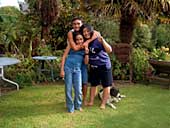 |
| |
| |
| |
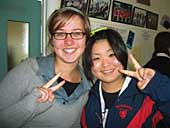 |
| |
| |
| |
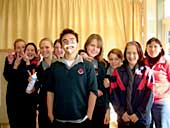 |
|
My Special Ten Months in NZ
"I'm
sorry, I don't know." These words were the level of my English when
I just started to go to school. I was afraid of my poor English skill
which couldn't catch most words from native students and teachers and
I couldn't speak any words that I really wanted to say. And now, I think
that my homesickness helped to make me be negative in those days as well.
Maybe I had a culture shock or something like that about foods, customs,
everything around me. Before I left Japan I read some books about New
Zealand and I thought that I understood all of them properly so it would
be easy to be abroad for me. But that thinking was wrong. There were many
differences from my imagination of New Zealand actually.
My school's name was "Mahurangi College" and my town's name
was "Wark Worth" which is in the North island and takes about
an hour by bus from Auckland. For the first five months, I stayed at a
farmer's home which is called a farm stay. They have a lot of pets and
domestic animals. When I just arrived there, I was quite heavily homesick
because of my poor English skill. But my host family always made me smile
and laugh so that my homesickness was gone somewhere in those five months.
My host parents said to me, "Miki, you are our daughter so you don't
have to feel lonely because we are your parents in New Zealand."
They accepted me as a member of their family. Then I accepted them as
a real family.
OK. Allow me to tell you about my school life for ten months. There were
so many international students from Greece, Germany, Italy, Switzerland,
China, Korea, Thailand and Japan. I was surprised at that. Some New Zealanders
didn't like Asians so they were not very kind and sometimes they said
to us many dirty words. Those words were very hurtful for us. But others
were kind to us. I think Japanese are negative and shy and also I think
New Zealanders are as well. So we needed to have guts to communicate with
each other to get over the high wall. I was taking Home Economics, Spanish,
Maths, Esol 3, Esol 4(English class for international students) as subjects.
In the Spanish class, many students often talked to me and became friends
with me. I wondered why they did that. I asked the Spanish teacher about
that and she told me what she did. A few days ago she told students about
me like "Miki is Japanese, but she is in New Zealand to learn English
now and also, she is trying to learn Spanish with English. She is cool!!
You guys should be friends with her!!" So they were interested in
me. That was a big chance for me to make friends! Then I could make some
good friends. Learning Spanish with English was not easy for me, but it
was a good opportunity to study hard and also it was practice to translate.
It made me learn lots of new English vocabulary. In Esol class, we often
had discussions about "School bullying," "Some kinds of
discrimination," "Religion," "Migration," "Egyptian
doctor's spelling-mistake in New Zealand" and so on. We talked about
these topics and then wrote our own essays. I quite liked those works
because everyone had different opinions.
After school, I couldn't go to town or a friend's home very often because
I was staying in the country-side which was 12 km from my school. I needed
to catch the school bus. My second host family's home was by the beach
called "Leigh Beach." It was such a beautiful place. A small
problem became nothing after going for walk. So sometimes I baked cakes,
breads and cookies. My host parents liked to learn anything so they always
asked me about Japanese culture, customs, and the government party. It
was difficult for me to explain to them because I didn't have enough knowledge
about these issues so sometimes I needed to search for information from
the internet. I felt ashamed as a Japanese. My best performance to make
them understand about tea ceremony was showing them how to do with a coffee
cup, spoon, a dish, a whisk and tissue. My host mother repeated after
me like "Otemae ・・・ chodaitashu mashu ・・・." We laughed aloud.
Through those 10 months, I became stronger than before and also learnt
about how we should always be proud of own country and culture. New Zealand
has its own culture, too. I learnt about it. Do you know this word "KIAORA"?
This is New Zealand's original inhabitants, Maori's language and means
"hello." New Zealanders are keeping on passing Maori culture
down from generation to generation. I think that Japanese young people
should be proud of our traditional culture and pass it down from generation
to generation like New Zealanders do. This opinion has come from my experiences
in New Zealand. If I didn't stay there, I wouldn't think like that. I
would like to go abroad again to study something like a special subject
with my English skill and of course I want to improve my English as well.
Probably next time, I would go to another country because I want to keep
trying to learn other countries' cultures. It was a great experience for
me studying abroad as I was in the second grade. Now, I really appreciate
Ikuei creating special chances to study abroad for us.
|
Chisato Sayama
Grade 12,
Foreign Language Course
Graduate at Murata Daiichi Jr. High
Studied at Rotary Exchange, U.S.A.
From September 2005 through June 2006
Entered Utsunomiya
University |
| |
| |
| |
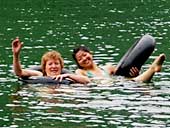 |
| |
| |
| |
 |
|
I wish I could
bloom like a flower in my life with my experience
My
host family was Ms. Pat Wright, who is a news publisher in Mount Vernon,
Texas. I think it'll affect my future that what I learned from her while
I spent just nine months with her. I was a very active Japanese, such as
joining a choir and a volleyball team, going camping, playing the piano
at churches and so on. Of course those are my unforgettable memories but
she means so much more than that to me. When I had worries like an obstacle
to communicate, she always gave me a hint to solve the problem. Also, we
have often talked over races and national characters of each country and
friends and so forth till the middle of the night. I think it lead me to
find out who I am. It was not until I saw my friends again in Ikuei that
I could realize that no one opened their mind to their host family like
I did.
What do you think about returnees? You may think that they are cool or they
must be fluent in English. It is difficult to answer concretely what I got
by studying abroad. My personality may have changed, I am a little kinder
and my command of English is better than when I left Japan a year ago. But
it is far from native speakers if I compared its level after all. Therefore
I sometimes feel uneasiness, about if I made a good decision or not plus
this current education in Japan. Recently the mass media take up having
children learn Japanese, which is our mother language, rather than English.
I do take it to heart as a returnee as if the society said "Don't flow
in Europe and America." While I was in America, I had a feeling that
all is not well since not studying for a whole year at school in Japan and
making my family burden with paying expensive money instead of getting something
unable to see or to learn in America. But I think it's good for me if I
feel that I was right to challenge myself to be open to a new world 10 or
20 years later eventually. I wish I could bloom like a flower in my life
from now someday with my experience which is studying abroad. |







